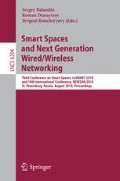Abstract
In this paper, we present a new data traffic scheduling scheme for the throughput maximization in the downlink multiple-input-multiple-output orthogonal frequency division multiple access (MIMO-OFDMA) in a single-cell multiuser environment with the channel side information of the transmitter. In our approach the data throughput maximization formulated as an optimization problem as well as the optimal results were obtained by solving the Kuhn-Tucker conditions. In order to find the optimal values we propose two solutions of these problems. Throughout the computing simulation, we compared suggested algorithms with the traditional FDMA algorithm.
Access this chapter
Tax calculation will be finalised at checkout
Purchases are for personal use only
Preview
Unable to display preview. Download preview PDF.
References
Bingham, J.A.C.: Multicarrier for Data Transmission: An Idea Whose Time Has Come. IEEE Comm. Magazine 28(5), 5–14 (1990)
Cimini Jr., L.J., Sollenberger, N.R.: OFDM with Diversity and Coding for High-Bit-Rate Mobile Data Applications, Mobile Multimedia Communications. In: Proc. of the IEEE Global Communications Conf., vol. 1, pp. 274–275 (1997)
Chang, M.-X., Su, Y.-T.: Model-based Channel Estimation for OFDM Signals in Rayleigh Fading. IEEE Trans. on Comm. 50, 540–545 (2002)
Cover, T.M., Thomas, J.A.: Elements of Information Theory. Wiley, New York (1991)
Ibars, C., Bar-Ness, Y.: Comparing the Performance of Coded Multiuser Access OFDM and Coded MC-CDMA over Fading Channels. In: Proc. IEEE INFOCOM, pp. 881–885 (2001)
Institute of Electrical and Electronics Engineers, Part 16: Air Interface for Fixed Broadband Wireless Access Systems, IEEE 802.16 (June 2004)
Institute of Electrical and Electronics Engineers, Part 16: Air Interface for Fixed and Mobile Broadband Wireless Broadband Wireless Access Systems, Amendment 2, IEEE 802.16e (December 2005), http://www.ieee.org/web/standards/home/index.html
Ishikava, H., Furudate, M., Ohseki, T., Suzuki, T.: Performance Analysis of Adaptive Downlink Modulation Using OFDM and MC-CDMA for Future Mobile Communications System. In: Proc. IEEE ISSSTA, August 2004, pp. 194–198 (2004)
Jeong, S.B., Kim, S., Lee, H.: Data Traffic Scheduling Algorithm for Multiuser OFDM System with Adaptive Modulation Considering Fairness Among Users. Computers and Operations Research 32, 1723–1737 (2005)
Koutsopoulos, I., Tassiulas, L.: Adaptive Resource Allocation in SDMA-based Wireless Broadband Networks with OFDM Signaling. In: IEEE Proc. INFOCOM, vol. 3, pp. 1376–1385 (2002)
Koutsopoulos, I., Ren, T., Tassiulas, L.: The Impact of Space-division Multiplexing on Resource Allocation: A Unified Approach. In: Proc. IEEE INFOCOM, vol. 1, pp. 533–543 (2003)
Li, G., Liu, H.: On the Optimality of Downlink OFDMA-MIMO Systems. In: Proc. Signals, Systems and Computers Conference, vol. 1, pp. 324–328 (2004)
Lo, E.S., Chan, P.W.C., Lau, V.K.N., Cheng, R.S., Letaief, K.B., Murch, R.D., Ho Mow, W.: Adaptive Resource Allocation and Capacity Comparison of Downlink Multiuser MIMO-MC-CDMA and MIMO-OFDMA. IEEE Trans. on Wireless Communications 6(3), 1083–1093 (2007)
Rhee, W., Cioffi, J.M.: Increase in Capacity of Multiuser OFDM System Using Dynamic Subcarrier Allocation. In: Proc. of the IEEE Vehicular Technology Conference (VTC 2000), pp. 1085–1089 (2000)
Tang, C., Stolpman, V.J.: Multiple Users Adaptive Modulation Schemes for MC-CDMA. In: Proc. IEEE GLOBECOM, pp. 3823–3827 (2004)
Wong, C.Y., Cheng, R.S., Letaief, K.B., Murch, R.D.: Multiuser OFDM with Adaptive Subcarrier, Bit, and Power Allocation. IEEE J. Select. Areas Commun. 17(10), 1747–1758 (1999)
Zhang, P., Tao, X., Zhang, J., Wang, Y., Li, L., Wang, Y.: A Vision from the Future Beyond 3G TDD. IEEE Comm. Magazine 43, 38–44 (2005)
Zhang, Y.J., Letaief, K.B.: An Efficient Resource Allocation Scheme for Spatial Multiuser Access in MIMO/OFDM System. IEEE Trans. on Commun. 53(1), 107–116 (2005)
Author information
Authors and Affiliations
Editor information
Editors and Affiliations
Rights and permissions
Copyright information
© 2010 Springer-Verlag Berlin Heidelberg
About this paper
Cite this paper
Martyna, J. (2010). Data Traffic Scheduling Algorithm for Multiuser MIMO-OFDM System with the Throughput Maximization. In: Balandin, S., Dunaytsev, R., Koucheryavy, Y. (eds) Smart Spaces and Next Generation Wired/Wireless Networking. ruSMART NEW2AN 2010 2010. Lecture Notes in Computer Science, vol 6294. Springer, Berlin, Heidelberg. https://doi.org/10.1007/978-3-642-14891-0_38
Download citation
DOI: https://doi.org/10.1007/978-3-642-14891-0_38
Publisher Name: Springer, Berlin, Heidelberg
Print ISBN: 978-3-642-14890-3
Online ISBN: 978-3-642-14891-0
eBook Packages: Computer ScienceComputer Science (R0)

